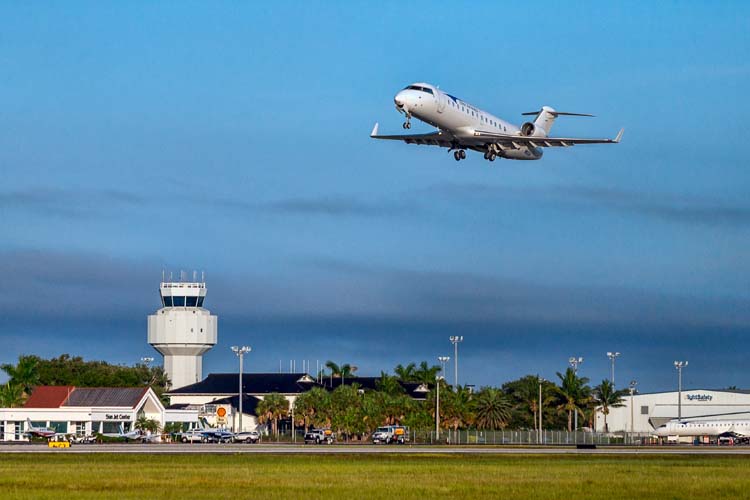County Administrator Jason Brown says Indian River County most likely will not fly to the rescue as Vero Beach tries to come up with funds to keep commercial airline passenger service at Vero Beach Regional Airport.
The funding shortfall cropped up when Elite Airways, the airport’s only passenger airline, boarded more than 10,000 passengers for the first time in 2018. That number triggered a reclassification of the airport from a general aviation airport to a commercial airport that will go into effect in July.
The reclassification reduces the airport’s eligibility for state grants and could cost the Vero as much as $1 million annually for airport projects in the city’s five-year plan, according City Manager Monte Falls, but Brown said that is the city’s problem.
Brown said he would recommend the County Commission refrain from taxing county residents to prevent passenger service at the airport from crashing.
“There has been a tendency for the city to look at county residents as takers and not contributors to the city airport,” Brown said. “The city raised the issue that some of the customers of Elite are county residents so they need to help pay for this, but I would also say county residents … support the airport in its other operations.”
“The other problem I have with the county putting in county tax dollars is governance,” Brown added. “County residents do not get to vote for City Council, so we have the taxation without representation problem.”
Using county-controlled tourist taxes, collected from hotel stays, isn’t an option either, Brown said. State law mandates those funds must be used for visitor centers, museums, zoos, sports stadiums, aquariums and beach renourishment projects.
Elite Airways President John Pearsall last week suggested implementing landing fees to help make up for the lost grant money, but such fees would not make much of a dent in the deficit, generating only about $45,000 per year.
The city was notified by the Florida Department of Transportation in December that the airport will be reclassified from a general aviation airport to a commercial airport.
Shortly afterward, in early January, the city’s Airport Commission voted unanimously to terminate Elite’s lease at the airport to preserve the state funding. But public sentiment strongly favors retaining passenger service at the airport and the City Council at its Jan. 21 meeting voted to renew the airline’s lease.
The council is expected to hold a workshop in the coming months to hash out a strategy aimed at keeping Elite in Vero long term.
Options the city is considering include reprioritizing airport projects to slow the loss of revenue, lobbying to change the state law that mandates the airport’s reclassification, raising property taxes on city residents and seeking help from the county.
The city’s top priority is pushing for a change in the state airport classification law so that the grant money will not be lost.
When an airport is designated as general aviation, the state usually covers 80 percent of the cost for large capital projects, while the city is responsible for 20 percent. With the commercial airport designation, the cost split would be 50/50.
“The real problem is the state law,” Airport Manager Eric Menger said. “We need to find a way to just make a small change to allow small airports like ours to not be so severely impacted by the reduction in grant funding. ”
City officials have asked state Sen. Debbie Mayfield (R-Melbourne) to file an amendment to an existing bill this legislative session, which is already underway, in order to effect the change.
“Senator Mayfield is looking into what she can do to support the airport,” Mayfield’s Legislative Assistant Adrienne Cronebaugh said in an email.
A short-term solution would be to delay pricey projects while efforts to change the law are underway to avoid quickly depleting the airport’s $3.5-million fund balance. That maneuver could buy the city up to 15 months to formulate a permanent fix, city officials said.
“We could delay some capital projects that could receive some FDOT funding for a year or a little more than a year,” Falls said.
“That would give us time to explore some of the options, and the most likely option would be to get that regulation changed.”
A last resort could be a property tax hike for city residents, but it would take a 13.8 percent boost in the city’s property tax rate to cover the $1 million shortfall, city officials said.
“It’s difficult to get legislative change,” Councilman Joe Graves said. “The only other way is asking 18,000 residents to be taxed to provide a benefit for the county and the region and I don’t think anyone wants to be taxed.”
The popular Maine-based airline has offered flights since 2015 from Vero to Newark, N.J., Portland, Maine, and other destinations. Elite has said that Vero is its best market, but it would have to have 200,000 passengers boarding in Vero to make up for the lost grant money, far more than the 11,084 passengers who flew out of Vero on Elite planes in 2018.
After the City Council vote, the city and Elite executed a three-year contract for the airline to continue operating at the airport, but the deal comes with a 60-day termination clause that can be invoked by either party.

